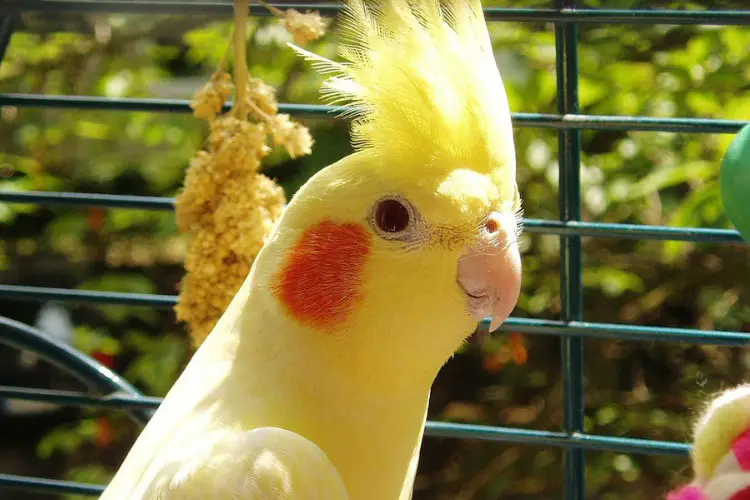Understanding and interpreting your cockatiel’s actions, what they mean, and how to respond to them is one of the most challenging elements of parrot ownership. One of the most prevalent cockatiel behaviors is looking at the wall for long periods without turning around.
So, why does my cockatiel face the wall? Cockatiels usually act this way if they are sick, terrified, or stressed. This is especially common if you have recently adopted a new cockatiel. It will shy away from you and mostly face the wall until it adapts to its surroundings. Give them time and space to warm up to you, and they will cease doing this.
This article will give you a detailed guide on reasons and solutions why your cockatiel might be facing the wall.
Why Does My Cockatiel Face The Wall?
Cockatiels have a “what they cannot see cannot hurt them” mentality. Therefore your cockatiel may face the wall to avoid something that causes it fear, stress, or anxiety. This reaction could be triggered by a change in their surroundings, a new environment, a stranger, or a pet.
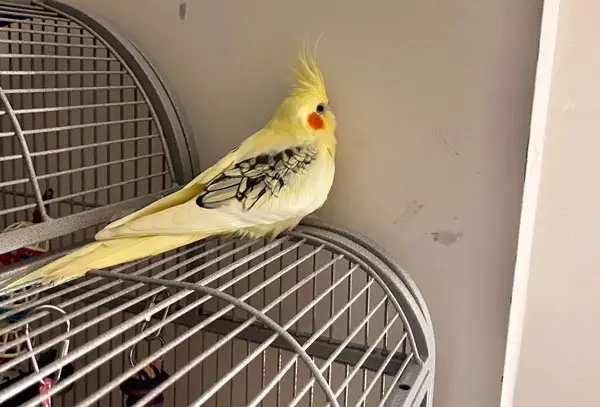
Also, if your cockatiel always faces the wall when you enter a room, you might reconsider your relationship. This behavior indicates that your budgie is unhappy with you. Let’s directly dive in and examine why cockatiels face the wall.
1. Stress
Cockatiels usually fly or attack when they encounter a predator or a threat. In a cage, they cannot fly, so the cockatiel will face the wall to avoid danger. That way, the cockatiel assumes it is invisible to the threat, and the danger will go away without harming it.
If you have a pet dog or cat in the same vicinity as your cockatiel, your bird will adapt the “facing the wall” survival mechanism. Another reason that might cause stress to the cockatiel is being in a new environment or being around new people.
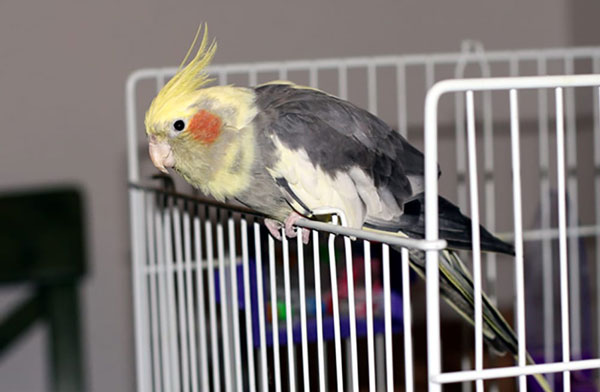
If a stranger approaches the cockatiel’s cage, it may turn and face the wall because it does not know the person and might be a threat. Poorly socialized cockatiels may respond negatively to new sights or sounds.
Older cockatiels that are well-socialized and have been with you for a long time are more likely to adapt to these changes. However, putting them in a new cage or repainting the space may still stress them out.
Other signs of stress include;
- It withdraws to the back of its cage
- Fault bars on the cockatiel’s feathers
- Screams when someone goes too close
- Avoids being touched
- Becomes extremely silent
- It avoids food and water
- It has difficulty sleeping and frequently experiences night terrors
2. Sickness
Cockatiels are very social birds. So, if yours is unwilling to interact, it may be in pain and avoids being held. As prey creatures, cockatiels make every effort to conceal their vulnerability. Aside from your cockatiel facing the wall, the following indicators will help you determine if your bird is in pain or discomfort;
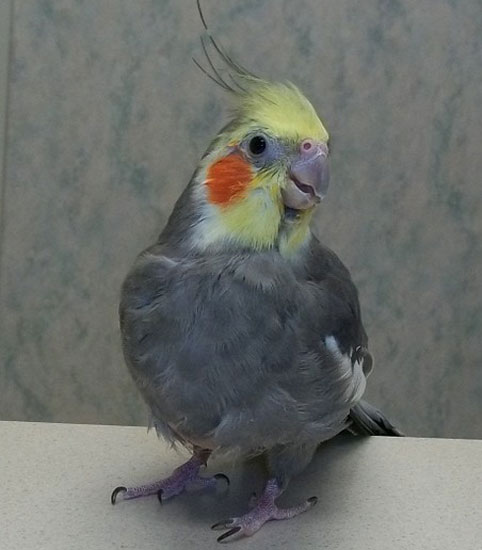
- General sluggishness and withdrawal
- Avoiding food or water
- Unusual grumpiness and hostility
- Unwillingness to play or exercise
- Reluctance to make noise all of a sudden
- Appetite and weight loss
- Unusual droppings
If you notice any of the following, consult a veterinarian so that they can perform tests and determine the problem. Some examples of health issues that may result from the cockatiel facing the wall are eye problems. If your cockatiel has vision problems, it may be unaware of what they are looking at. Therefore, it may choose to face the wall.
3. Boredom
Sometimes, your cockatiel might suffer from a psychiatric issue, such as depression. Depression results from cockatiels spending a lot of time alone or if a cage mate dies. If your cockatiel isn’t getting enough enrichment, it’s prone to depression.
Depression can cause symptoms similar to physical ailments, such as your cockatiel losing interest in its environment. If this is the cause of your cockatiel facing the wall, you must take action to stimulate your bird’s life.
4. Attention seeking
Cockatiels form strong bonds with their owners. So, if the owner ignores it or does something that the cockatiel finds displeasing, the cockatiel faces the wall to get the owner’s attention.
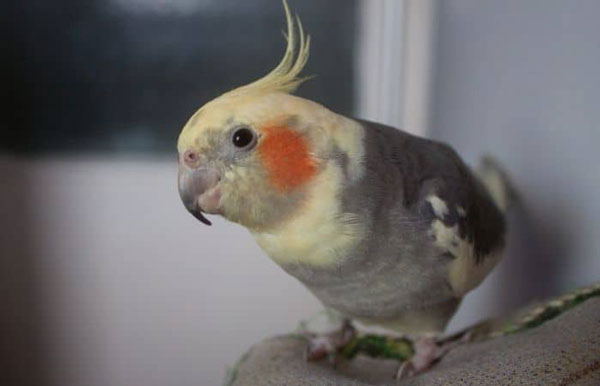
If you detect your cockatiel looking away once and quickly pet or give it a treat, it may learn to repeat that strange behavior. Why? Because they will be rewarded by getting your attention. In addition, cockatiels face the wall to express rage. If your cockatiel acts this way, evaluate whether you have lately done something that has hurt it.
Here are some of the reasons that might annoy a cockatiel;
- Ignoring the cockatiel
- Going on vacation without the cockatiel
- Excessive attention to another pet or person
- Offering more food or toys to another bird; cockatiels can experience jealousy.
- Keeping the cockatiel awake because of disturbance
- Failing to give the proper balance of light and darkness
- Failure to provide enough exercise for the cockatiel, e.g., time outside the cage.
5. Reacting to change
Cockatiels will react to anything new with fear and view it as a threat. It could be a new food bowl, a different room color, a toy, or even a new diet. That could lead to the cockatiel facing the wall to ignore the latest additions in its surroundings.
The cockatiel will need time to adapt to the new things in its surroundings. Also, keep an eye out for triggering stimuli around a cockatiel’s cage, i.e., either noise, light, or temperature changes.
What Should I Do If My Cockatiel Faces The Wall
As we have seen, cockatiels face the wall due to several reasons. So, you should identify the cause for making the cockatiel face the wall and resolve it. Here are solutions that can help you.
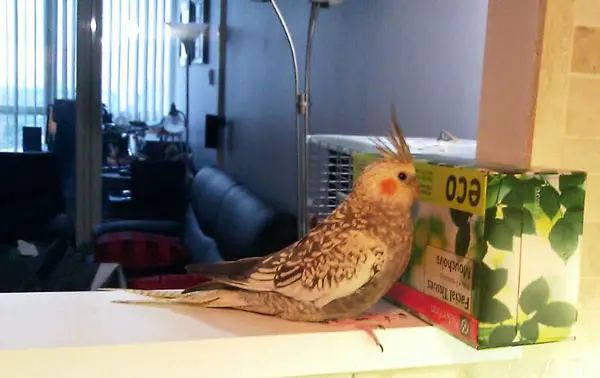
Remove any stress triggers
If the cockatiel’s habitat contains a stressor, removing it should reduce its stress. Be it another pet or the cage being too near the window.
Avoid yelling
Always calmly talk to your cockatiel, especially if it is already scared. Yelling scares the cockatiel and tells the bird that the behavior attracts your attention.
Slow movements
Do not approach your cockatiel from above or behind it. When coming your bird or you are attempting to pet it, move slowly. Also, you can train your cockatiel with a stick if it dislikes being handled.
Entertainment
Provide the cockatiel with toys, puzzles, or a companion to resolve the issue of boredom and loneliness. That makes it easy for the bird even if you go away for a trip. You can also rotate the toys every two weeks to keep things interesting.
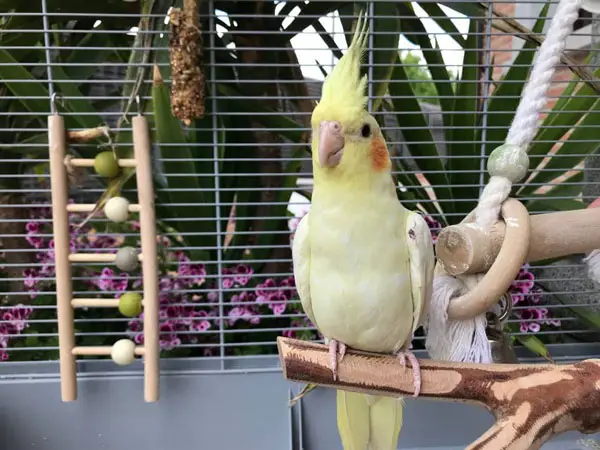
Time outside the cage
Ensure your cockatiel gets to fly outside to stretch its wings. This also allows you to bond with the cockatiel at a deeper level.
Avoid sudden changes
If you plan on changing anything in the cockatiel’s surroundings, do it gradually. That gives the cockatiel time to adapt to its new phenomena. Knowing the cockatiel’s overall sensitivity before making any modifications will assist prevent stress. If a new person upsets the bird, slowly acclimatize the bird to the new member and focus on positive reinforcement such as treats.
Time and space
If the cockatiel is new, avoid hovering around it now and then. You can try hand-feeding some treats so that it gets used to you. If the cockatiel is still adamant, give it more time and space.
FAQs
Now that we have covered reasons and solutions why a cockatiel might face the wall, here are other related questions.
Cockatiels will face the wall when sleeping, resting or when it is new to their surroundings. If your cockatiel’s favorite sleeping position is when facing the wall, then there is no problem at all. For a new cockatiel, give it time to get used to its surroundings.
Your cockatiel might be facing the wall because it looks at its reflection. If the cage is positioned in a way that the cage’s rear end is near the window, the cockatiel will spend time staring at itself because cockatiels love doing that.
However, if your cockatiel is scared for any reason we have discussed, it may stare at the wall. As a result, you need to look for more signals to distinguish which is which.
Conclusion
Cockatiels will face the wall when they feel threatened, scared, or ill. For sickness and fear, you will notice other accompanying signs such as lethargy, screaming, or fault bars. Other reasons include; boredom and sudden changes. It is usual for some cockatiels to face the wall when sleeping or resting.
Ensure you identify why the cockatiel is facing the wall and if it is sick, contact a vet. If scared, remove the stressor and add toys or a companion to its cage if bored. I hope the article has helped you understand why cockatiels face the wall.
